Get free scan and check if your device is infected.
Remove it nowTo use full-featured product, you have to purchase a license for Combo Cleaner. Seven days free trial available. Combo Cleaner is owned and operated by RCS LT, the parent company of PCRisk.com.
What kind of application is DefaultCommand?
During our analysis of DefaultCommand, we identified it as adware — unwanted software that displays intrusive ads. Security vendors also classify DefaultCommand as malicious, indicating that its advertisements may lead to harmful or deceptive content. For this reason, users are strongly advised not to install this application.
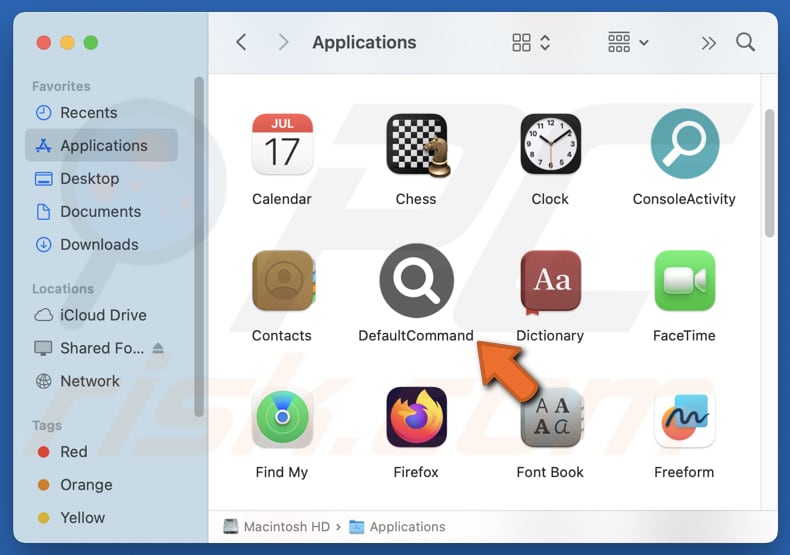
DefaultCommand adware in detail
Once installed, DefaultCommand generates intrusive banners, pop-ups, coupons, and other types of advertisements. These ads may feature fake alerts, offers, warnings, or similar deceptive content. Clicking on them can lead users to unreliable websites, trigger unexpected downloads, and expose them to scams, malware, or other threats.
Websites promoted through DefaultCommand's ads can be created to steal sensitive information, such as login credentials, credit card numbers, ID details, and more. Additionally, these sites can deceive users into downloading potentially harmful software or transferring money to scammers (e.g., paying for fake technical support or other services).
Moreover, the app has the potential to monitor browsing habits, capture search queries, and record device data, sometimes including sensitive information like emails or passwords. This type of data harvesting poses privacy concerns and can lead to additional problems.
It is also worth noting that adware often uses a significant amount of system resources, causing the device to run slower, freeze, crash, or disrupt other programs. Additionally, adware can be difficult to uninstall—some components may remain in the system even after the removal.
Because of these issues, DefaultCommand is regarded as a security risk and should be removed. If users cannot delete it manually, using a reliable removal tool like Combo Cleaner is recommended to ensure complete removal.
| Name | Ads by DefaultCommand |
| Threat Type | Adware, Mac malware, Mac virus |
| Detection Names | Avast (MacOS:AdAgent-L [Adw]), Combo Cleaner (Gen:Variant.Adware.MAC.Adload.16), ESET-NOD32 (A Variant Of OSX/Adware.Synataeb.H), Kaspersky (Not-a-virus:HEUR:AdWare.OSX.Adload.j), Full List (VirusTotal) |
| Additional Information | This application belongs to Adload malware family. |
| Symptoms | Your Mac becomes slower than normal, you see unwanted pop-up ads, you are redirected to dubious websites. |
| Distribution methods | Deceptive pop-up ads, free software installers (bundling), torrent file downloads. |
| Damage | Internet browser tracking (potential privacy issues), display of unwanted ads, redirects to dubious websites, loss of private information. |
| Malware Removal (Windows) |
To eliminate possible malware infections, scan your computer with legitimate antivirus software. Our security researchers recommend using Combo Cleaner. Download Combo CleanerTo use full-featured product, you have to purchase a license for Combo Cleaner. 7 days free trial available. Combo Cleaner is owned and operated by RCS LT, the parent company of PCRisk.com. |
Conclusion
To sum up, DefaultCommand is an unwanted application that can negatively impact system performance, threaten user privacy, and expose users to scams and other online threats. Affected users should remove this app to protect devices and personal information. Examples of other apps with similar behavior are AccessCoordinator, Valenciennes.app, and FatHomage.app.
How did DefaultCommand install on my computer?
Adware commonly comes packaged with other software, often free or less trustworthy applications, and is installed when users skip the installation steps without making any changes. Ignoring options like "Advanced", "Custom", or "Manual" (or ticked boxes) during setup can cause users to unknowingly accept additional programs, including adware.
Also, adware often spreads via misleading advertisements or notifications displayed by untrustworthy websites. It can also be downloaded from unofficial app stores or websites, peer-to-peer (P2P) networks, third-party download managers, free file-sharing platforms, and similar sources.
How to avoid installation of unwanted applications?
Always download applications from official sources or well-known app stores. When installing software, take your time to read through each step and make sure to uncheck any additional programs or offers you do not want. Avoid interacting with pop-ups, ads, or links while visiting questionable sites, and do not grant notification permissions to untrustworthy sites.
Make sure your operating system and all software are up to date. Regularly scan your computer with a reliable security program to detect and remove potential threats. If your computer is already infected with DefaultCommand, we recommend running a scan with Combo Cleaner Antivirus for Windows to automatically eliminate this adware.
A pop-up that appears after the installation of DefaultCommand:
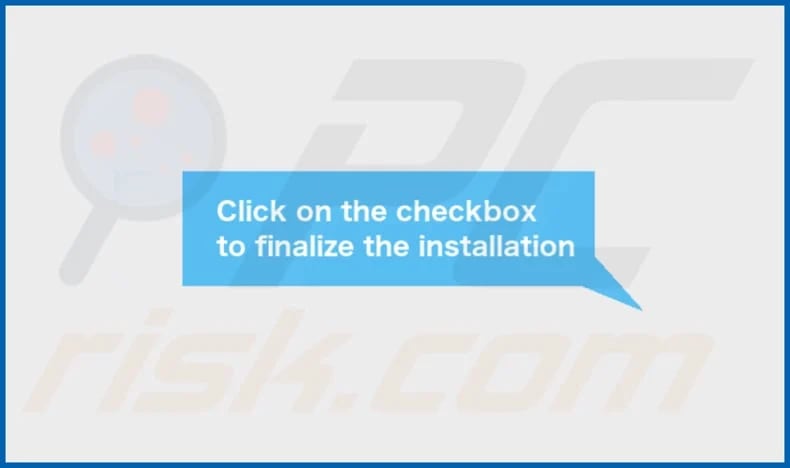
DefaultCommand installation folder:
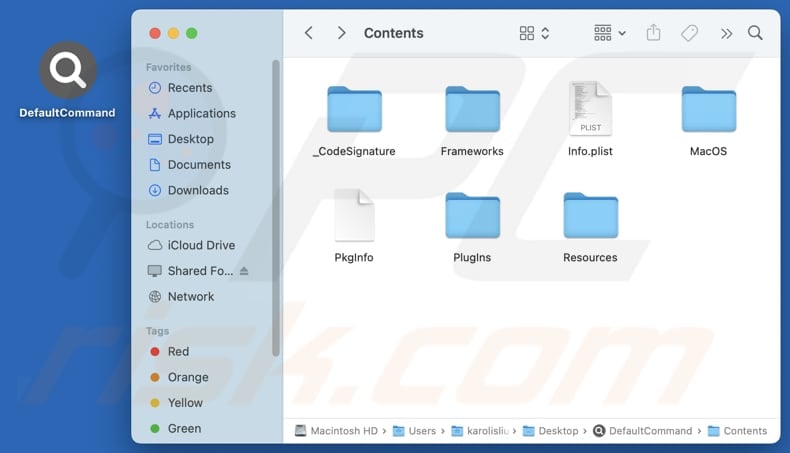
Instant automatic malware removal:
Manual threat removal might be a lengthy and complicated process that requires advanced IT skills. Combo Cleaner is a professional automatic malware removal tool that is recommended to get rid of malware. Download it by clicking the button below:
DOWNLOAD Combo CleanerBy downloading any software listed on this website you agree to our Privacy Policy and Terms of Use. To use full-featured product, you have to purchase a license for Combo Cleaner. 7 days free trial available. Combo Cleaner is owned and operated by RCS LT, the parent company of PCRisk.com.
Quick menu:
- What is DefaultCommand?
- STEP 1. Remove DefaultCommand related files and folders from OSX.
- STEP 2. Remove DefaultCommand ads from Safari.
- STEP 3. Remove DefaultCommand adware from Google Chrome.
- STEP 4. Remove DefaultCommand ads from Mozilla Firefox.
Video showing how to remove DefaultCommand adware using Combo Cleaner:
DefaultCommand adware removal:
Remove DefaultCommand-related potentially unwanted applications from your "Applications" folder:
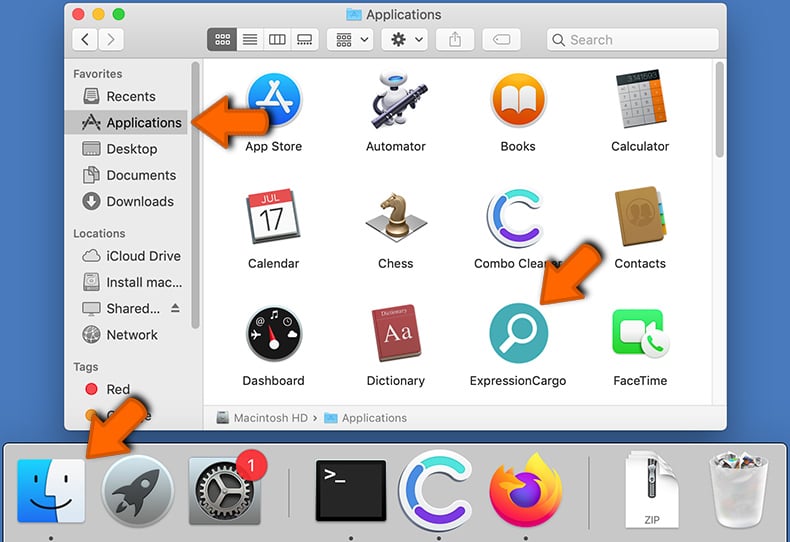
Click the Finder icon. In the Finder window, select "Applications". In the applications folder, look for "MPlayerX", "NicePlayer", or other suspicious applications and drag them to the Trash. After removing the potentially unwanted application(s) that cause online ads, scan your Mac for any remaining unwanted components.
DOWNLOAD remover for malware infections
Combo Cleaner checks if your computer is infected with malware. To use full-featured product, you have to purchase a license for Combo Cleaner. 7 days free trial available. Combo Cleaner is owned and operated by RCS LT, the parent company of PCRisk.com.
Remove adware-related files and folders
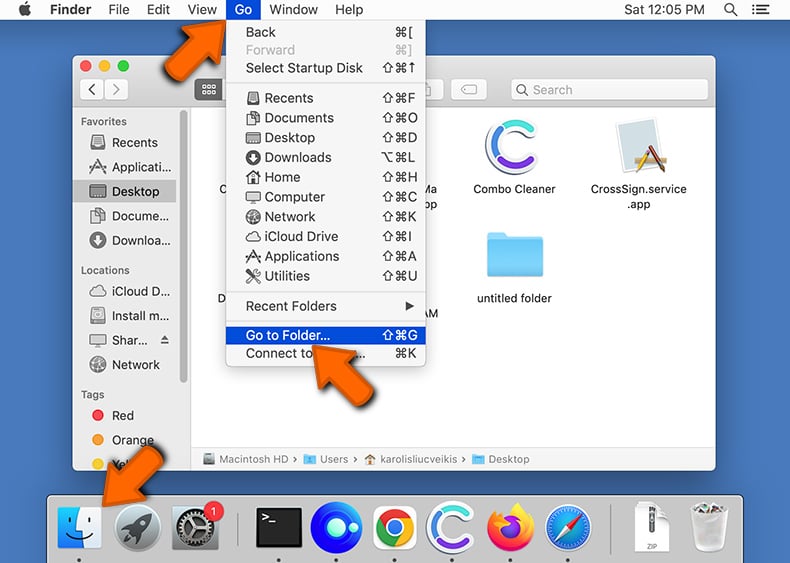
Click the Finder icon, from the menu bar. Choose Go, and click Go to Folder...
 Check for adware generated files in the /Library/LaunchAgents/ folder:
Check for adware generated files in the /Library/LaunchAgents/ folder:
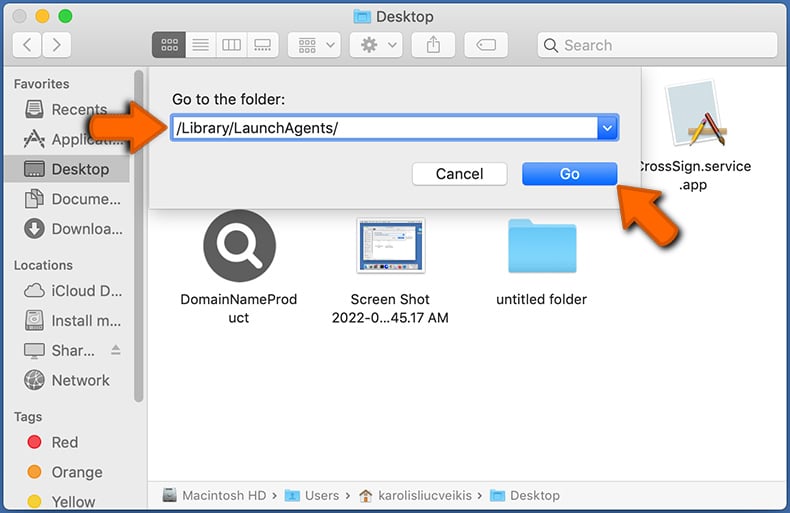
In the Go to Folder... bar, type: /Library/LaunchAgents/
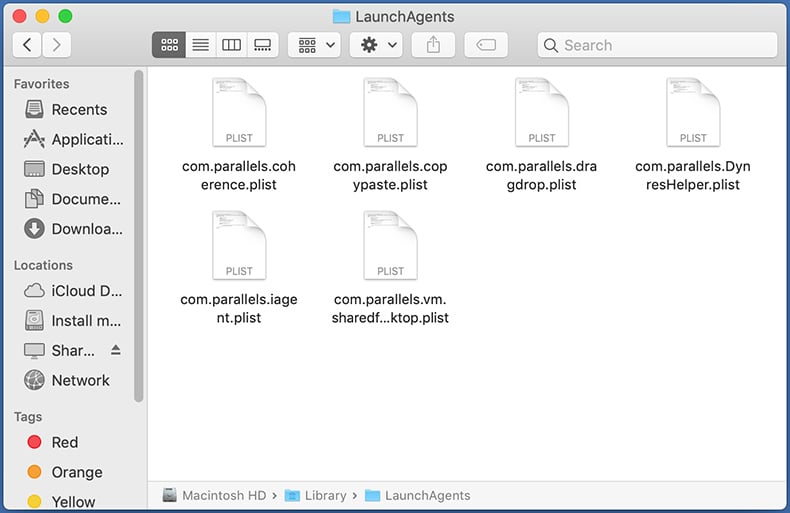
In the "LaunchAgents" folder, look for any recently-added suspicious files and move them to the Trash. Examples of files generated by adware - "installmac.AppRemoval.plist", "myppes.download.plist", "mykotlerino.ltvbit.plist", "kuklorest.update.plist", etc. Adware commonly installs several files with the exact same string.
 Check for adware generated files in the ~/Library/Application Support/ folder:
Check for adware generated files in the ~/Library/Application Support/ folder:
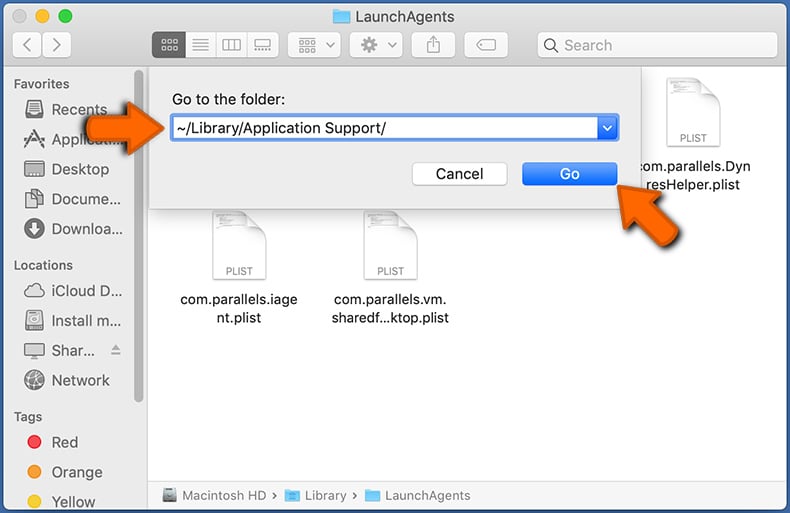
In the Go to Folder... bar, type: ~/Library/Application Support/
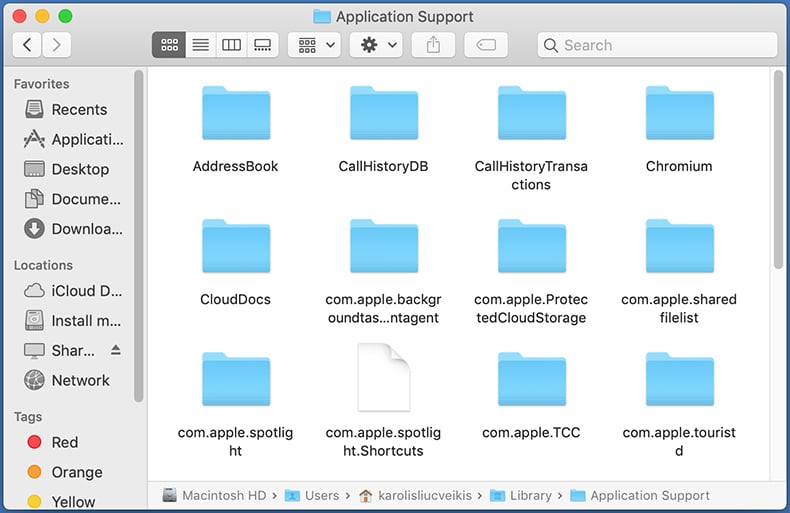
In the "Application Support" folder, look for any recently-added suspicious folders. For example, "MplayerX" or "NicePlayer", and move these folders to the Trash.
 Check for adware generated files in the ~/Library/LaunchAgents/ folder:
Check for adware generated files in the ~/Library/LaunchAgents/ folder:
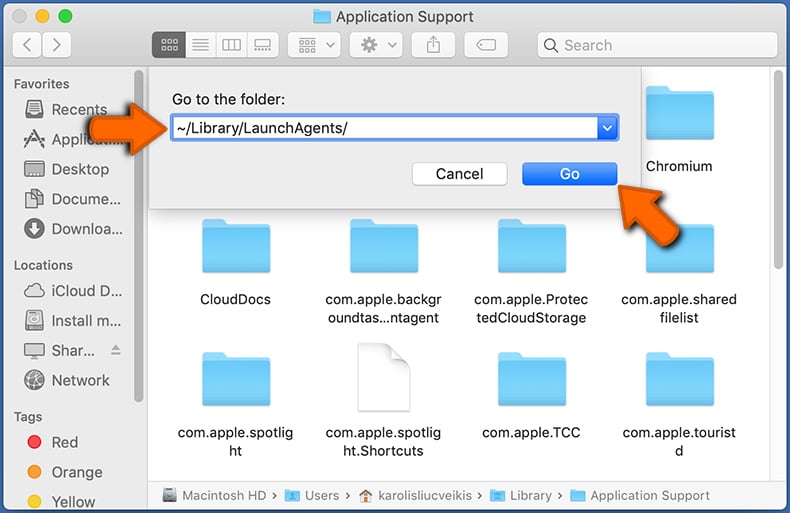
In the Go to Folder... bar, type: ~/Library/LaunchAgents/
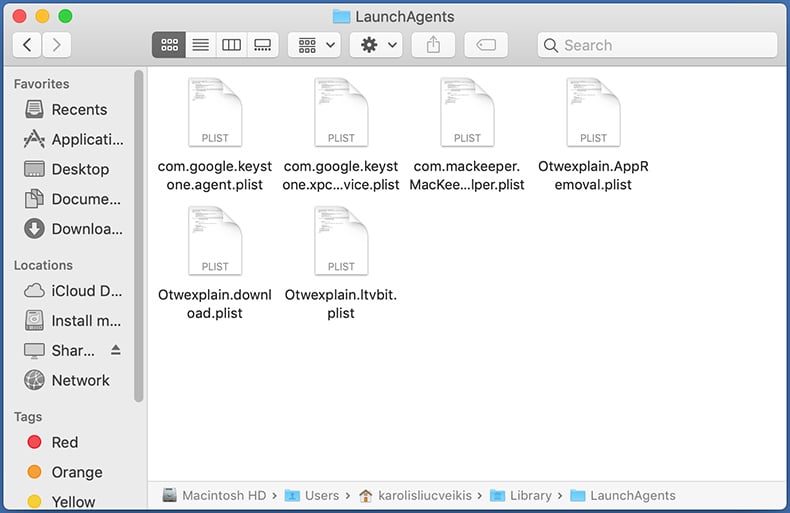
In the "LaunchAgents" folder, look for any recently-added suspicious files and move them to the Trash. Examples of files generated by adware - "installmac.AppRemoval.plist", "myppes.download.plist", "mykotlerino.ltvbit.plist", "kuklorest.update.plist", etc. Adware commonly installs several files with the exact same string.
 Check for adware generated files in the /Library/LaunchDaemons/ folder:
Check for adware generated files in the /Library/LaunchDaemons/ folder:
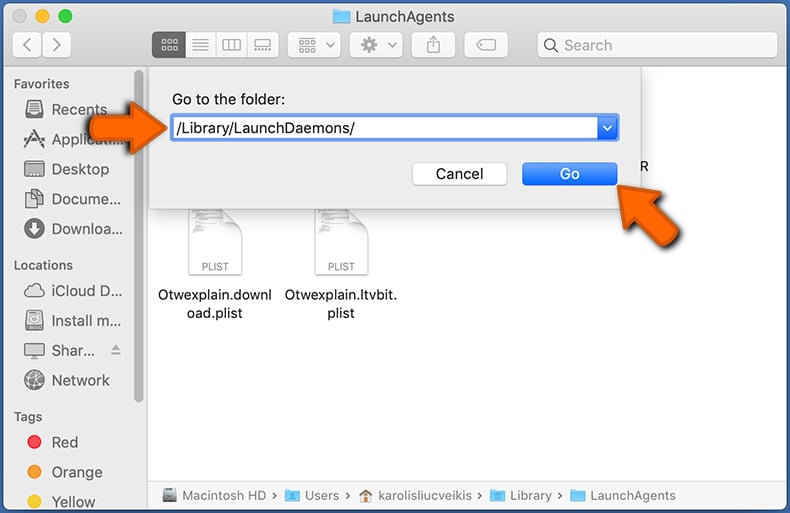
In the "Go to Folder..." bar, type: /Library/LaunchDaemons/
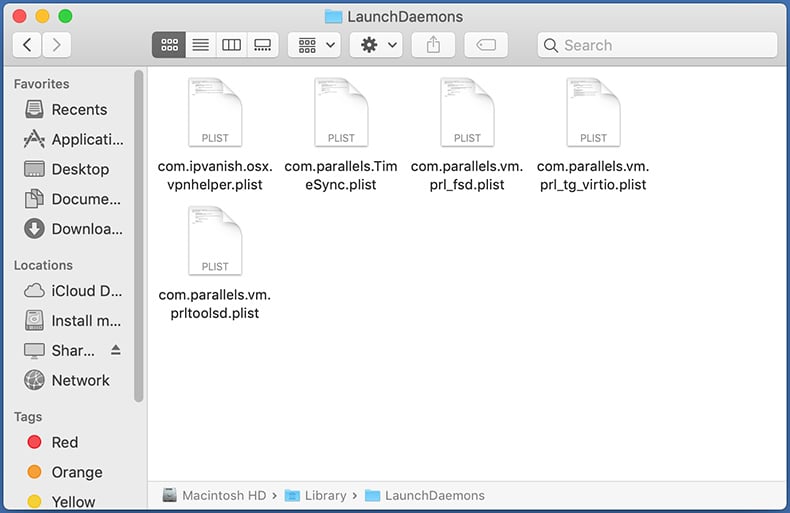
In the "LaunchDaemons" folder, look for recently-added suspicious files. For example "com.aoudad.net-preferences.plist", "com.myppes.net-preferences.plist", "com.kuklorest.net-preferences.plist", "com.avickUpd.plist", etc., and move them to the Trash.
 Scan your Mac with Combo Cleaner:
Scan your Mac with Combo Cleaner:
If you have followed all the steps correctly, your Mac should be clean of infections. To ensure your system is not infected, run a scan with Combo Cleaner Antivirus. Download it HERE. After downloading the file, double click combocleaner.dmg installer. In the opened window, drag and drop the Combo Cleaner icon on top of the Applications icon. Now open your launchpad and click on the Combo Cleaner icon. Wait until Combo Cleaner updates its virus definition database and click the "Start Combo Scan" button.
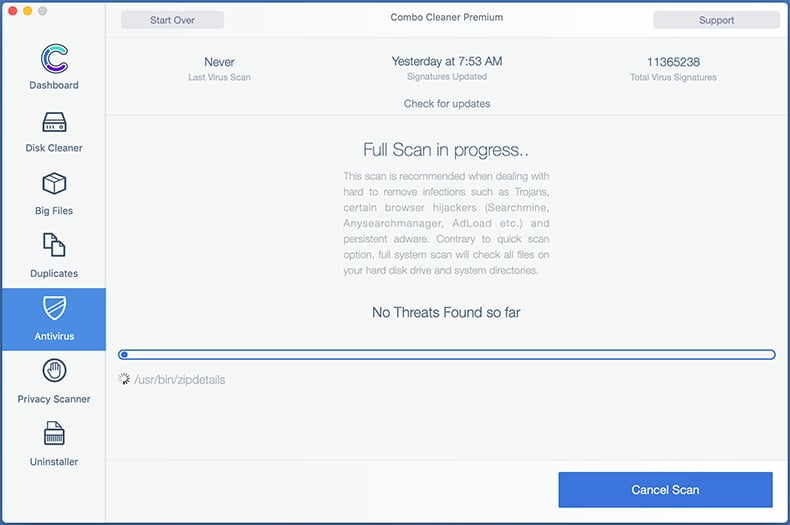
Combo Cleaner will scan your Mac for malware infections. If the antivirus scan displays "no threats found" - this means that you can continue with the removal guide; otherwise, it's recommended to remove any found infections before continuing.
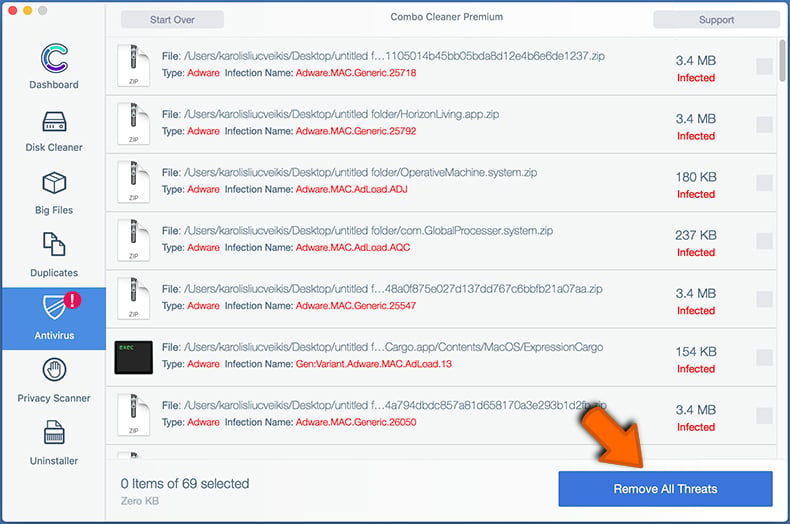
After removing files and folders generated by the adware, continue to remove rogue extensions from your Internet browsers.
Remove malicious extensions from Internet browsers
 Remove malicious Safari extensions:
Remove malicious Safari extensions:
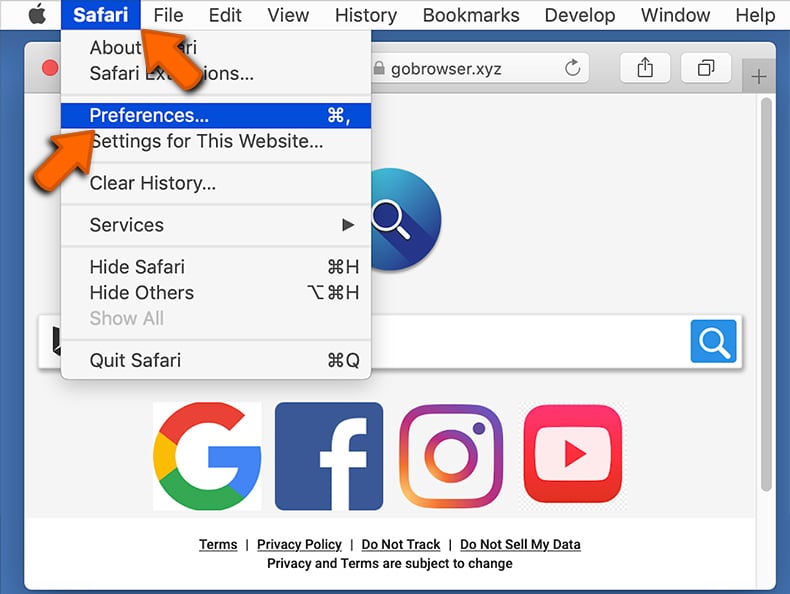
Open the Safari browser, from the menu bar, select "Safari" and click "Preferences...".
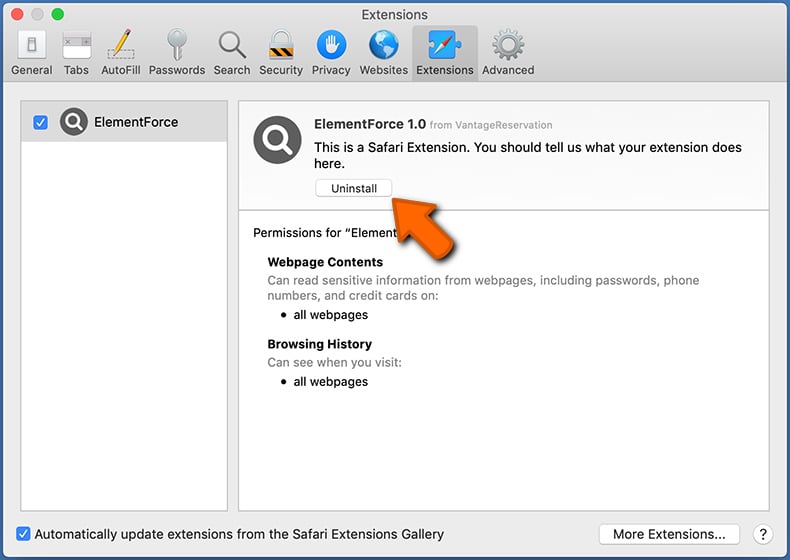
In the preferences window, select "Extensions" and look for any recently-installed suspicious extensions. When located, click the "Uninstall" button next to it/them. Note that you can safely uninstall all extensions from your Safari browser - none are crucial for regular browser operation.
- If you continue to have problems with browser redirects and unwanted advertisements - Reset Safari.
 Remove malicious extensions from Google Chrome:
Remove malicious extensions from Google Chrome:
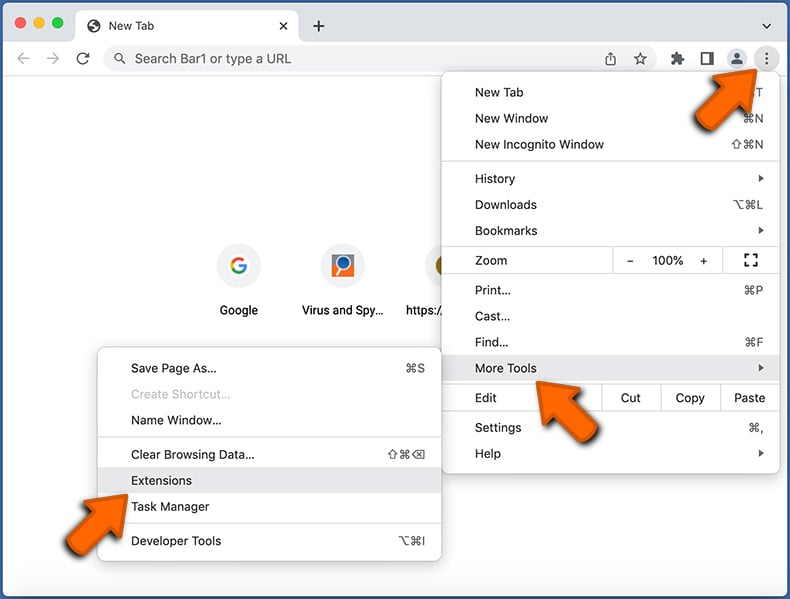
Click the Chrome menu icon ![]() (at the top right corner of Google Chrome), select "More Tools" and click "Extensions". Locate all recently-installed suspicious extensions, select these entries and click "Remove".
(at the top right corner of Google Chrome), select "More Tools" and click "Extensions". Locate all recently-installed suspicious extensions, select these entries and click "Remove".
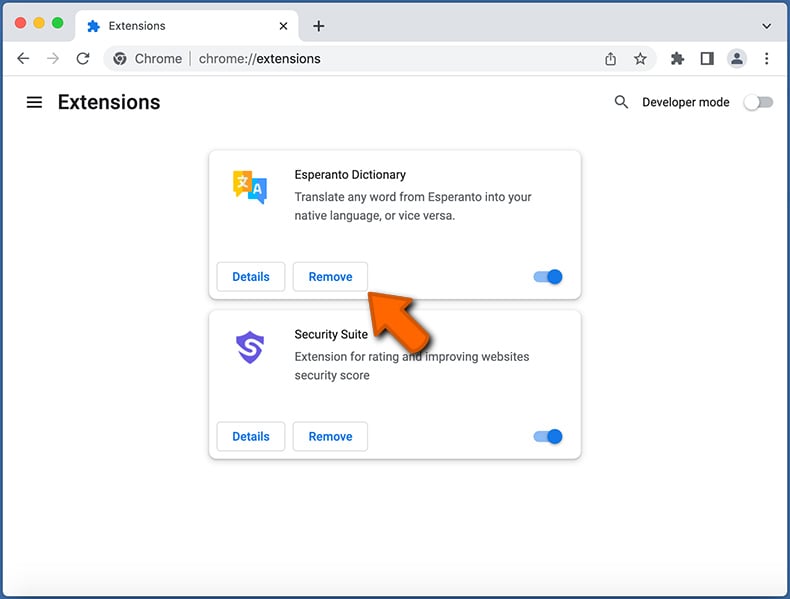
- If you continue to have problems with browser redirects and unwanted advertisements - Reset Google Chrome.
 Remove malicious extensions from Mozilla Firefox:
Remove malicious extensions from Mozilla Firefox:
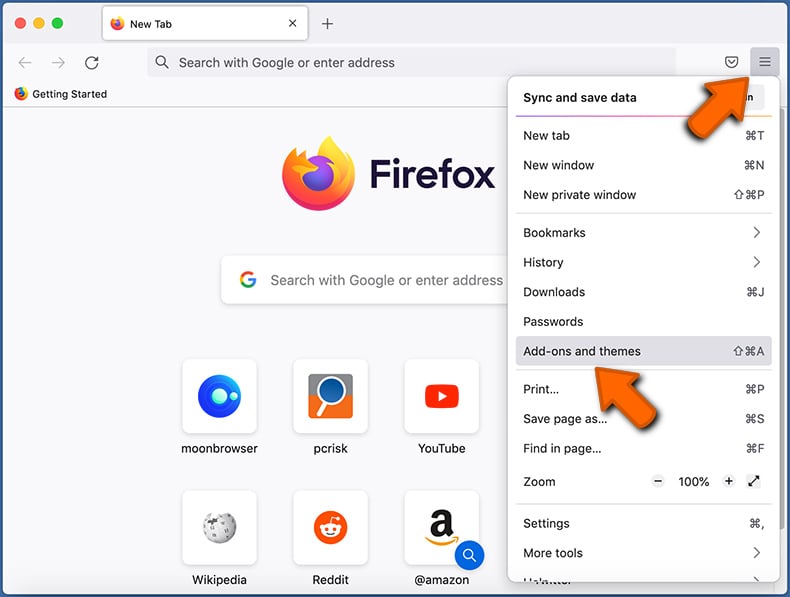
Click the Firefox menu ![]() (at the top right corner of the main window) and select "Add-ons and themes". Click "Extensions", in the opened window locate all recently-installed suspicious extensions, click on the three dots and then click "Remove".
(at the top right corner of the main window) and select "Add-ons and themes". Click "Extensions", in the opened window locate all recently-installed suspicious extensions, click on the three dots and then click "Remove".
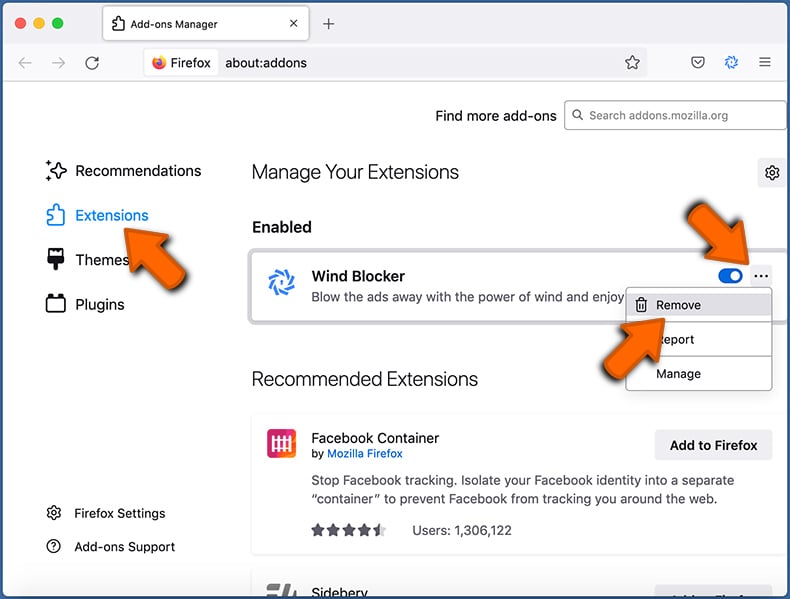
- If you continue to have problems with browser redirects and unwanted advertisements - Reset Mozilla Firefox.
Frequently Asked Questions (FAQ)
What harm can adware cause?
Adware can slow down your device, display intrusive ads, track online activity, compromise privacy, and expose users to scams or malicious websites.
What does adware do?
The purpose of adware is to show ads. Additionally, it can collect information and change the settings of web browsers.
How do adware developers generate revenue?
Adware developers usually profit by promoting products, websites, or services. A significant portion of their earnings comes from affiliate programs that pay for driving traffic or user interactions.
Will Combo Cleaner remove DefaultCommand adware?
Yes, Combo Cleaner can perform a system scan to detect and eliminate adware and other unwanted programs. Unlike manual removal, which may leave behind hidden components, Combo Cleaner helps ensure that all traces of the adware are completely removed from the system.
Share:

Tomas Meskauskas
Expert security researcher, professional malware analyst
I am passionate about computer security and technology. I have an experience of over 10 years working in various companies related to computer technical issue solving and Internet security. I have been working as an author and editor for pcrisk.com since 2010. Follow me on Twitter and LinkedIn to stay informed about the latest online security threats.
PCrisk security portal is brought by a company RCS LT.
Joined forces of security researchers help educate computer users about the latest online security threats. More information about the company RCS LT.
Our malware removal guides are free. However, if you want to support us you can send us a donation.
DonatePCrisk security portal is brought by a company RCS LT.
Joined forces of security researchers help educate computer users about the latest online security threats. More information about the company RCS LT.
Our malware removal guides are free. However, if you want to support us you can send us a donation.
Donate
▼ Show Discussion